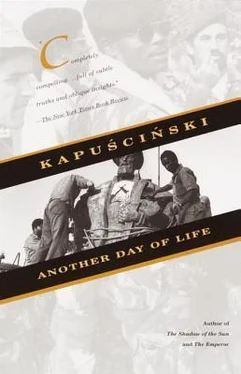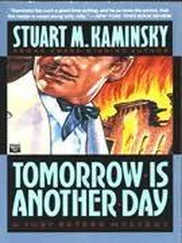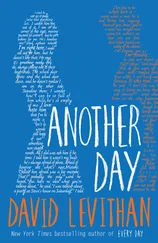The building of the wooden city, the city of crates, goes on day after day, from dawn to twilight. Everyone works, soaked with rain, burned by the sun; even the millionaires, if they are physically fit, turn to the task. The enthusiasm of the adults infects the children. They too build crates, for their dolls and toys. Packing takes place under cover of night. It’s better that way, when no one’s sticking his nose into other people’s business, nobody’s keeping track of who puts in how much and what (and everyone knows there are a lot of that sort around, the ones who serve the MPLA and can’t wait to inform).
So by night, in the thickest darkness, we transfer the contents of the stone city to the inside of the wooden city. It takes a lot of effort and sweat, lifting and struggling, shoulders sore from stowing it all, knees sore from squeezing it all in because it all has to fit and, after all, the stone city was big and the wooden city is small.
Gradually, from night to night, the stone city lost its value in favor of the wooden city. Gradually, too, it changed in people’s estimation. People stopped thinking in terms of houses and apartments and discussed only crates. Instead of saying, “I’ve got to go see what’s at home,” they said, “I’ve got to go check my crate.” By now that was the only thing that interested them, the only thing they cared about. The Luanda they were leaving had become a stiff and alien stage set, empty, for the show was over.
Nowhere else in the world had I seen such a city, and I may never see anything like it again. It existed for months, and then it suddenly began disappearing. Or rather, quarter after quarter, it was taken on trucks to the port. Now it was spread out at the very edge of the sea, illuminated at night by harbor lanterns and the glare of lights on anchored ships. By day, people wound through its chaotic streets, painting their names and addresses on little plates, just as anyone does anywhere in the world when he builds himself a house. You could convince yourself, therefore, that this is a normal wooden town, except that it’s been closed up by its residents who, for unknown reasons, have had to leave it in haste.
But afterward, when things had already turned very bad in the stone city and we, its handful of inhabitants, were waiting like desperadoes for the day of its destruction, the wooden city sailed away on the ocean. It was carried off by a great flotilla with which, after several hours, it disappeared below the horizon. This happened suddenly, as if a pirate fleet had sailed into the port, seized a priceless treasure, and escaped to sea with it.
Even so, I managed to see how the city sailed away. At dawn it was still rocking off the coast, piled up confusedly, uninhabited, lifeless, as if magically transformed into a museum exhibit of an ancient Eastern city and the last tour group had left. At that hour it was foggy and cold. I stood on the shore with some Angolan soldiers and a little crowd of ragtag freezing black children. “They’ve taken everything from us,” one of the soldiers said without malice, and turned to cut a pineapple because that fruit, so overripe that, when it was cut, the juice ran out like water from a cup, was then our only food. “They’ve taken everything from us,” he repeated and buried his face in the golden bowl of the fruit. The homeless harbor children gazed at him with greedy, fascinated eyes. The soldier lifted his juice-smeared face, smiled, and added, “But anyway, we’ve got a home now. They left us what’s ours.” He stood and, rejoicing in the thought that Angola was his, shot off a whole round from his automatic rifle into the air. Sirens sounded, seagulls darted and wheeled over the water, and the city stirred and began to sail away.
I don’t know if there had ever been an instance of a whole city sailing across the ocean, but that is exactly what happened. The city sailed out into the world, in search of its inhabitants. These were the former residents of Angola, the Portuguese, who had scattered throughout Europe and America. A part of them reached South Africa. All fled Angola in haste, escaping before the conflagration of war, convinced that in this country there would be no more life and only the cemeteries would remain. But before they left they had still managed to build the wooden city in Luanda, into which they packed everything that had been in the stone city. On the streets now there were only thousands of cars, rusting and covered with dust. The walls also remained, the roofs, the asphalt on the roads, and the iron benches along the boulevards.
And now the wooden city was sailing on an Atlantic swept by violent, gale-driven waves. Somewhere on the ocean the partition of the city occurred and one section, the largest, sailed to Lisbon, the second to Rio de Janeiro, and the third to Cape Town. Each of these sections reached its haven safely. I know this from various sources. Maria wrote to tell me that her crates ended up in Brazil — crates that had been part of the wooden city. Many newspapers wrote about the fact that one section made it to Cape Town. And here’s what I saw with my own eyes. After leaving Luanda, I stopped in Lisbon. A friend drove me along a wide street at the mouth of the Tagus, near the port. And there I saw fantastic heaps of crates stacked to perilous heights, unmoved, abandoned, as if they belonged to no one. This was the largest section of the wooden Luanda, which had sailed to the coast of Europe.
Back in the days when the erection of the wooden city had barely begun, the merchants had the biggest headaches. What could they do with the merchandise of all kinds that lay in the shops and filled the warehouses to their cobwebbed ceilings? No one could imagine a crate capable of accommodating the inventory of the leading wholesaler in Luanda, Dom Castro Soremenho e Sousa. And the other wholesalers? And the thousand-strong clans of specialist retailers?
In addition, the whole import trade was behaving as if somebody was playing with less than a full deck. European firms — didn’t anybody read the newspapers back there? — were shipping back-ordered merchandise to Luanda, oblivious of the fact that flames of armed conflagration were licking at Angola. Who now needed the complete sets of bathroom equipment shipped yesterday by Koenig and Sons GmbH, Hamburg? Who could suppress a chuckle at the arrival from London of an order of tennis balls, rackets, and golf clubs? As if for the sake of irony, a big shipment of insecticide sprayers came in from Marseilles — ordered by the very coffee planters now fighting for seats on flights to Europe.
Dom Urbano Tavares, the proprietor of a jewelry shop on the main street, can feel content despite the mad unhappiness everywhere. When he chose his line of work years ago, he hit the bull’s-eye. Gold always sells, and what’s left fits easily into carry-on luggage. Lively action marks his business now. But not only gold is booming. People are rushing above all to food shops, because there is less and less to eat. Jostling crowds fill clothing and shoe stores. Watches and miniature radios, cosmetics and medicine are selling — small, light items that can be useful in the new life in countries beyond the sea.
A visit to a bookshop on Largo de Portugal leaves a sad impression. It is empty. Dust has settled in a gray layer on the old counter. Not a single customer. Who wants to read books now? The soldiers bought up the last pornographic magazines long ago and took them to the front. What’s left — stacks of masterpieces mixed with the most second-rate reading matter — interests no one. Scribblers can draw an important lesson in modesty here. Immortal classics and page-turner romances are equally unattractive to the refugees for a simple reason: paper is heavy.
A shop bearing the pious name Cruz de Cristo also stands empty. The specialty of the house is selling and renting wedding dresses. The owner, Dona Amanda, sits motionless for hours, unoccupied, among a crowd of similarly unmoving mute mannequins bewitched by some invisible fairy. There are enough dresses to furnish one of those mass weddings still popular in Mexico to this day. All white, right down to the ground, but each one cut differently, each one splendid in its baroque wealth of flounces and lace. What does Dona Amanda look forward to? One need only glance through the display window at her downcast, gloomy face. The time for joy and weddings has passed and left Dona Amanda surrounded by the unneeded props of an extinguished epoch.
Читать дальше











